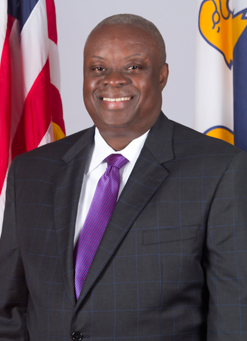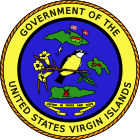
Politics of the Northern Mariana Islands takes place in a framework of a presidential representative democratic system, whereby the Governor is head of government, and of a pluriform multi-party system. The Northern Mariana Islands is an unincorporated territory of the United States, and in a political union with it in the form of a commonwealth. Executive power is exercised by the governor. Legislative power is vested in the two chambers of the legislature. The judiciary is independent of the executive and the legislature. Local government is carried out through four regional mayors.

The United States Virgin Islands, officially the Virgin Islands of the United States, are a group of Caribbean islands and an unincorporated and organized territory of the United States. The islands are geographically part of the Virgin Islands archipelago and are located in the Leeward Islands of the Lesser Antilles.

In United States law, an organic act is an act of the United States Congress that establishes a territory of the United States and specifies how it is to be governed, or an agency to manage certain federal lands. In the absence of an organic law a territory is classified as unorganized.

Saint John is one of the Virgin Islands in the Caribbean Sea and a constituent district of the United States Virgin Islands (USVI), an unincorporated territory of the United States.

The Jones–Shafroth Act – also known as the Jones Act of Puerto Rico, Jones Law of Puerto Rico, or as the Puerto Rican Federal Relations Act of 1917 – was an Act of the United States Congress, signed by President Woodrow Wilson on March 2, 1917. The act superseded the Foraker Act and granted U.S. citizenship to anyone born in Puerto Rico on or after April 11, 1899. It also created the Senate of Puerto Rico, established a bill of rights, and authorized the election of a Resident Commissioner to a four-year term. The act also exempted Puerto Rican bonds from federal, state, and local taxes regardless of where the bondholder resides.
The Guam Organic Act of 1950, is a United States federal law that redesignated the island of Guam as an unincorporated territory of the United States, established executive, legislative, and judicial branches, and transferred federal jurisdiction from the United States Navy to the United States Department of the Interior. For the first time in over three hundred years of foreign colonization, the people of Guam had some measure of self-governance, however limited. Before that time there was some participation in the Local Administration, through the mayors or "gobernadorcillos" in Spanish times, who acted under the supervision of the Governor of the Mariana Islands.

The United States Virgin Islands, often abbreviated USVI, are a group of islands and cays located in the Lesser Antilles of the Eastern Caribbean, consisting of three main islands and fifty smaller islets and cays. Like many of their Caribbean neighbors, the history of the islands is characterized by native Amerindian settlement, European colonization, and the Atlantic slave trade.

The United States Court for China was a United States district court that had extraterritorial jurisdiction over U.S. citizens in China. It existed from 1906 to 1943 and had jurisdiction in civil and criminal matters, with appeals taken to the U.S. Court of Appeals for the Ninth Circuit in San Francisco.

The District of Columbia and United States Territories quarters were a series of six quarters minted by the United States Mint in 2009 to honor the District of Columbia and the unincorporated United States insular areas of Puerto Rico, Guam, the United States Virgin Islands, American Samoa, and the Northern Mariana Islands. The islands commonly grouped together as the United States Minor Outlying Islands were not featured, as the law defined the word "territory" as being limited to the areas mentioned above. They followed the completion of the 50 State Quarters Program. The coins used the same George Washington obverse as with the quarters of the previous 10 years. The reverse of the quarters featured a design selected by the Mint depicting the federal district and each territory. Unlike on the 50 State quarters, the motto "E Pluribus Unum" preceded and was the same size as the mint date on the reverse.

Kenneth Ezra Mapp is an American politician who served as the eighth elected Governor of the United States Virgin Islands, from 2015 to 2019. He is registered Republican, but ran as an independent.
The Fifth Constitutional Convention of the U.S. Virgin Islands proposed a constitution for the United States Virgin Islands in May 2009.
Henry A. Millin was a United States Virgin Islander banker and politician. Millin served as the fourth Lieutenant Governor of the United States Virgin Islands from 1978 until 1983.
Julio A. Brady was an American Virgin Islander judge, politician and attorney. Brady served as the Lieutenant Governor of the United States Virgin Islands from 1983 to 1987 during the second term of former Governor Juan Francisco Luis. Prior to his death, Brady served as a U.S. Virgin Islands Superior Court judge since 2006.

The Enabling Act of 1906, in its first part, empowered the people residing in Indian Territory and Oklahoma Territory to elect delegates to a state constitutional convention and subsequently to be admitted to the union as a single state.
Same-sex marriage has been legal in the United States Virgin Islands since July 9, 2015, as a result of the U.S. Supreme Court's decision in Obergefell v. Hodges. On June 26, 2015, the Supreme Court ruled that same-sex couples have a constitutional right to marry under the Equal Protection and Due Process clauses of the Fourteenth Amendment, legalizing same-sex marriage in the U.S. Virgin Islands. On June 30, Governor Kenneth Mapp said the territorial government would comply with the ruling, and on July 9 he signed an executive order that requires the government to extend marriage rights to same-sex couples. The first marriage licenses were granted on July 21, 2015, after the first same-sex couples to apply for licenses did so on July 13, beginning the 8-day waiting period between applying for and receiving marriage licenses.
Cannabis in the United States Virgin Islands is legal for recreational use since January 18, 2023, under territorial law. Legislation to legalize was passed by the territorial legislature in 2022, and was signed into law on January 18. Medical use was legalized in 2019 through a bill that passed the Senate 9–4. It remains illegal under federal law.
The Elective Governor Acts of 1968 are a pair of acts passed by the 90th United States Congress in 1968, which provide for the Governor of the U.S. Virgin Islands and the Governor of Guam to be popularly elected, rather than appointed as they had been up to that point. The two acts are individually titled the Virgin Islands Elective Governor Act and the Guam Elective Governor Act. The impetus for the acts came from extensive lobbying efforts by both Guamanians and Virgin Islanders. The Guam Legislature, led by Speaker Antonio Borja Won Pat, had begun lobbying Congress for popular elections in 1962. In the Virgin Islands, the act stemmed from the recommendations of the territory's first Constitutional Convention in 1964–5, which included the popular election of the governor. The acts were seen as a breakthrough for political reform both in Guam and the Virgin Islands. The Guam act was controversial, however, for authorizing federal auditing of the territory's accounts by the Interior Department—a practice that remained in place as of 2020.

Albert Bryan Jr. is an American politician serving since 2019 as the ninth governor of the United States Virgin Islands.

Edith L. Williams was a United States Virgin Islands educator, women's rights activist, and suffragist. Williams was the first woman who attempted to vote in the Virgin Islands and when she was denied the right to register, she petitioned the court along with Eulalie Stevens and Anna M. Vessup to review their qualifications. They won their case and subsequently women throughout the Virgin Islands who were literate and property owners were allowed to vote. A bust of Williams was installed in the Franklin Delano Roosevelt Veterans Memorial Park in Charlotte Amalie, and the James Madison Elementary School was renamed as the Edith L. Williams School in 1981 in her honor.
The United States Virgin Islands are a group of around 90 islands, islets, and cays in the Caribbean region in which inhabitants were claimed by Spain in 1493. No permanent settlements occurred in the Spanish period and the islands were colonized by Denmark in 1671. The inhabitants remained Danish nationals until 1917. From that date, islanders have derived their nationality from the United States. Nationality is the legal means in which inhabitants acquire formal membership in a nation without regard to its governance type. In addition to being United States' nationals, Virgin Islanders are both citizens of the United States and [local] citizens of the Virgin Islands. Citizenship is the relationship between the government and the governed, the rights and obligations that each owes the other, once one has become a member of a nation.











